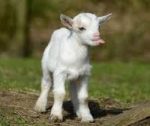There are several reason why some breeders feed their baby goats with non-mothered milk: from a rejecting mother, their mother’s death, orphaned litter, and the list goes on. In the tragic chance this situations calls for you, it is your responsibility as a smart breeder to consider your milk choices carefully.
Young goats require a sterilised source of nutritions before they start weaning and consuming solid food. Otherwise, a source with poor nutritional value could raise a sickly “kid”. Other than their value, it also helps that breeders monitor the amount consumed per feeding session to maintain a good growing weight.
Regardless of the many things to consider, the most important factor to think of first remains the type of milk choice. So, without further, here are 5 types of milk you could feed to goats.
1. Avoid Formulated Human Infant Milk
There are numerous types of for formulated milk, but the one type you should definitely avoid feeding baby goats are those designated for humans. It is no brainer that humans and baby goats would require different nutritional needs, therefore it is insufficient to uniform their diets.
More so, aside from malnutrition, baby goats would be at risk of several illnesses – the most common would be diarrhea. Therefore, it helps that smart breeders opt for other formulated options.
However, if you find yourself in a circumstance where formulated human infant milk is your only viable option, be sure to consider the following before you feed your goats:
- Make sure the milk is in good condition
- Check if the formulated milk is due to expire soon, or are already infested with bacteria
- Add in more fat substance
- Add in about 20-30% of extra fat substance to boost the litter’s energy. Common forms of fat substance would be fish oils
- Add in more protein and vitamins
- Be sure to add in more protein and vitamins to the formula. Baby goats require a sufficient amount of nutrition to grow, so adding eggs for protein and other formulated vitamins would help
- Add in Colustrum
- Read through the end of this article to find out how to make one of your own!
2. Find Another Nursing Mother
Arguably, the safest choice in terms of nutritional value is to feed the baby goats another nursing mother’s milk. Its highly likely uniformed with their biological mother’s, with similar values and consistency.
In feeding another mother’s milk, there are several mediums to adopt. Some would opt to milking a nursing mother and bottle fed the product, whilst some would place the baby goats in the same premises as the mother. If you do choose to adopt the second option, be sure to monitor the situation as theres a chance the nursing mother would reject the litter.
3. Un-Pasteurized Cow Milk
If finding a nursing mother is not a viable option, fresh un-pasteurized cow milk is another option to consider. Be sure, however, that the milk is un-pasturized to avoid bacteria contamination from foreign materials. Note that every kind of dairy product are prone to contamination, and it isn’t wise to feed them to growing infants.
Bottle feeding them could prevent other contamination from the open air. In doing so, make sure that the litter has tested the milk and is safe to consume. Some baby goats have a sensitive stomach, so are prone to diarrhea.
4. Milk Replacer
Milk Replacers are formulated milk for baby goats. On the markets, they are often referred to as Calf Milk Replacer (CMR) and are usually consumed by baby cows. Unfortunately, formulated milk specifically for goats are not sold that commonly.
In weighing this option, be sure that your baby goats are able to consume them without any side effects (such as diarrhea). It helps to test a small amount beforehand.
5. Colostrum
Colostrum are do-it-yourself formulated milk that you could make in a pinch. The recipe often consists of cow milk, fish oil, eggs, honey, and sugar. To assemble, these are some basic instructions to follow:
- Prepare 0.25-0.5 L of Cow Milk
- Add in 1 tablespoon of fish oil
- Add in 1 egg
- Add in a half tablespoon of Honey/Sugar
- Mix well and relocate them into a bottle feeder
Note that this is just an emergency option and should not be a goat’s main diet – as it is prone to bacteria infections as well.
Avoid Feeding Your Litter Multiple Types
Though you’d would want the best for your farm, it helps that you do not feed your litter multiple forms of milk at once. This could trigger bacterial infections and other stomach problems. Uniformity would prevent digestive shocks and other illnesses, so be sure to consider your milk choices wisely.
So this marks the end of 5 types of milk you could feed to goats. Make sure to take some time off to consult professionals and do more prior research before you feed your goats well. It also helps to conduct trial tests on the different types beforehand to make sure that your choice is the right formula for them. Good luck!

